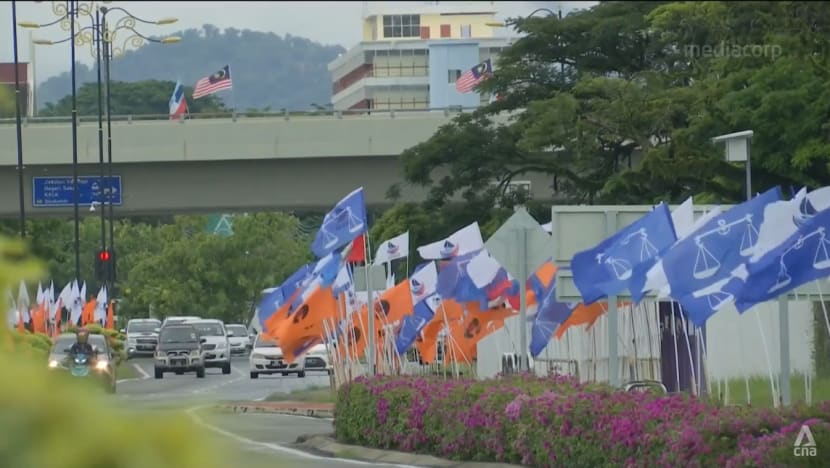CNA Explains: As potential kingmakers, how will parties in Sabah and Sarawak shape Malaysia GE15?
With 25 per cent of all parliamentary seats being in Sabah and Sarawak, both states could play a decisive outcome in determining which coalition gets to form the next government.

The Borneo states of Sabah and Sarawak together hold a quarter of Malaysia’s parliamentary seats.
KOTA KINABALU, Sabah: As in previous general elections, all eyes are usually on Peninsula Malaysia where major coalitions like Barisan Nasional (BN), Pakatan Harapan (PH), and from this year, Perikatan Nasional (PN) are battling it out to form the government.
Many analysts have predicted that the road ahead for all coalitions will be a very tough one after the 15th General Election (GE15), with many contests for the 222 parliamentary seats likely to see very close calls.
To improve their chances of securing the 112-seat majority needed to form the new government, the three main coalitions have made offers to the smaller coalitions and parties in Sabah and Sarawak.
Among the key offers include the possibility of a deputy prime minister post as well as more financial and development aid if these parties decide to come on board and form the new federal government.
On Tuesday (Nov 15), BN vice-president who is also the coalition’s candidate for prime minister, Ismail Sabri Yaakob said that BN is prepared to form the next coalition government with the likely inclusion of parties from Sabah and Sarawak.
He said that although it is still too early to decide which parties BN may want to work with, he identified Sarawak’s Gabungan Parti Sarawak (GPS) and Sabah’s Gerakan Rakyat Sabah (GRS) as possible Borneo coalitions that would be invited to join the BN-led government.
In the likely possibility that all the major coalitions will not secure the 112-seat majority by themselves, the contribution of seats from these Borneo states may become pivotal in determining the outcome of GE15.
That’s when the spotlight would be cast eastward towards Sabah and Sarawak post-GE15 as they become potential kingmakers.
WHY ARE SABAH, SARAWAK KINGMAKERS?
For this general election, Sabah and Sarawak are seen as kingmakers.
In the last 2018 election though, the kingmakers then were PAS (Parti Islam Se-Malaysia). That is because back then, the battle for votes was mainly between BN and the then-main – and only – opposition bloc PH.
Before 2018, Sabah and Sarawak were considered BN's vote banks. So back then, PAS held the kingmaker role, as it could join either BN or PH to form the government if the 2018 election results were too close to call.
But following a series of party hopping by lawmakers in 2020 dubbed the Sheraton Move (the very hotel where the events unfolded), the PH bloc split and two new coalitions emerged, which are led by ex-prime ministers who served since 2018: Muhyiddin Yassin who formed PN and Dr Mahathir Mohamad who established Gerakan Tanah Air (GTA).
There is also what is left in PH led by Mr Anwar Ibrahim, as well as BN which is attempting to wrest back control of Putrajaya.
Analysts have predicted that no single coalition would emerge a clear winner this time.
This means each coalition will have to look towards Sabah and Sarawak for support: These two states collectively hold 56 out of 222 parliamentary seats, or 25 per cent of the total seats.
WHO WILL SARAWAK BACK?
Observers say Sarawak will most likely back BN.
The state’s ruling GPS coalition – which currently holds 19 out of 31 parliamentary seats there – will easily win the majority of the seats in Sarawak, according to observers.
This means GPS will be the main coalition that can pick any of the peninsula blocs – and that is most likely BN, says ISEAS-Yusof Ishak Institute’s Dr Lee Poh Onn, whose expertise is Sarawak politics.
Both GPS and BN are informal partners who work well together. They have a gentleman’s agreement in that BN will not enter Sarawak to contest in that state, Dr Lee said.
“And even if GPS were to back BN to form government, voters in Sarawak are unlikely to be concerned because they know GPS leader Abang Johari Openg, who’s also Sarawak premier, will fiercely protect Sarawak and Sarawakians,” he said.
University of Tasmania professor of Asian Studies James Chin said: “I would go as far as to say that if BN is in second pole position, GPS would rather go with Barisan rather than anybody else for the simple reason that they’ve worked with the BN partners for a long time”.
“In fact, GPS was actually Sarawak Barisan Nasional before GE2018, so BN would be its first preference,” Dr Chin said.
WHAT ABOUT SABAH?
The politics in Sabah, however, are less straightforward as compared to Sarawak, said analysts.
“In terms of Sabah, it’s very, very messy. There are basically three big groups competing against each other,” Prof Chin said.
They include the ruling GRS and BN coalitions, Sabah’s biggest opposition party Warisan as well as PH component party Democratic Action Party (DAP).
“Because of this, the votes in Sabah will be highly split,” Prof Chin said.
“My assessment is that if there are no big political earthquakes in Sabah, GRS will be on track to win about 10 to 12 seats, UMNO Sabah between six and seven seats, while opposition Warisan is on track for between five and six seats,” he said.
Currently, the ruling GRS and BN bloc holds 12 out of 25 federal seats in Sabah while Warisan holds seven. The rest are held by other local parties.
If the GRS-BN bloc emerges victorious, then Sabah would naturally support BN in Peninsula Malaysia, analysts say.
WILL THERE BE SURPRISES?
Even though it is widely expected that Sarawak’s GPS would side with BN to form the government, there is always room for surprises.
ISEAS-Yusof Ishak Institute's Dr Lee said generally, GPS will work with whichever bloc is seen as friendly to it.
But would that include PH, which had hinted it was keen to work with Sarawak but was slammed by GPS leader Abang Jo for cancelling major infrastructure projects while it was in government?
“I wouldn’t take any of the statements made during or before the election as the Gospel Truth,” University of Tasmania’s Prof Chin said.
“During the election, (candidates) say all sorts of things … sometimes without thinking,” he said.
When asked if he thought GPS would work with PH, Prof Chin said there was a chance, but that GPS may impose additional conditions.
“For example, if PH is obviously in a very, very strong position, GPS may say ‘that’s fine, we’ll work with you but we do not want, for example, DAP to hold the finance minister’s portfolio because we’ve had problems with that before’,” Prof Chin said.
Back when PH was in federal government after 2018, then-finance minister Lim Guan Eng had said Sarawak could go bankrupt within three years, under GPS leadership.
But Prof Chin added: “Don’t forget that when it comes to politics, there are no permanent friends, no permanent enemies.”
“It’s really the sort of negotiations that you agree to live with, within certain limits or certain parameters,” he said.
THE ROAD AHEAD
Regardless of whom Sabah and Sarawak choose to back to form the government, Prof Chin said he is confident that there will be a “stable government”.
“Everybody understands that Malaysia needs a strong, stable government to bring the country back to normalcy after two years of the pandemic when the economy was really badly damaged,” Dr Chin said.
“Knowing Malaysian politicians quite well, I can assure you that they’re quite willing to come together to form a stable government because everybody understands that it really doesn’t matter whether (you hold) Islamist or Malay nationalist or Chinese liberal views, you cannot move the country forward if, every two years or every 17 months, you keep changing governments,” he said.
Prof Chin added he is confident that the new government formed after GE15 would last for the first three or four years.
That is because, after the federal elections, politicians would focus on holding state elections next year when their five-year terms are due.
Currently, only three BN-held states – Perlis, Perak, Pahang – have been dissolved for state elections to be held concurrently with the Nov 19 parliamentary elections.
“Everyone is priming for the state election fight – there are plenty of battles ahead so I don’t think they will switch governments just like that. It’s just not a smart move,” he said.


















